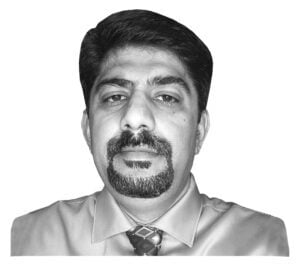Davos in the desert
Fake news spreads more rapidly than wild fire in Pakistan; first media and second the academia are to blame for this disorder. The commentary on the recent visit of Prime Minister Shahbaz Sharif to Kingdom of Saudi Arabia on the media is fraught with speculations that have nothing to do with ground reality. The visit is being linked to the controversies that are raging on political front at home, implying that the Kingdom is taking sides.
To start with, the Prime Minister, Finance Minister Ishaq Dar, Defence Minister Khawaja Asif and other government representatives from Pakistan were invited to the Future Investment Initiative, an annual event that Riyadh has been hosting for the past six years.
Representatives of the Pakistan government were part of over 6,000 participants who attended the event from 50 countries. Yet, they were not noted prominently by Saudi media outlets. In mainstream newspapers of English language, interactions between Saudi and Chinese, American and Russian decision-makers define the main agenda.
An outlet released brief footage of the Prime Minister standing on the stage and saying how impressed he was by the splendid arrangements for “Davos in the Desert”, as the gathering is nicknamed.
The theme of the conference was “Investing in humanity: Enabling a new global order”. A pull for ‘new global order’ has been irresistible ever since the US introduced it. The US-sponsored order, was, basically a move to drive the world towards unipolarity, but it did not give the world what it promised. Flow of information like the flow of wealth was one-way.
The Saudi initiative sounds more profound. The Kingdom and the US have been having tension, kicked off by comments of the US Secretary of State Anthony Blinken. Blinken calls for “recalibration” of the ties between the two countries and many Saudi high-ups have stated making it clear that their country and the people comes first.
The standoff, however, did not stop top US investors and big media names from participating in the conference. Saudi Finance Minister Muhammad Al-Jadaan says that the Kingdom is among top choices of the global investors because the Kingdom’s “banking sector is very strong and there are no challenges to liquidity”. He is of the opinion that participation of global investors in the Future Investment Initiative points to the confidence that the world has developed in their system. He also mentioned that the Kingdom is the fastest growing economy among G-20 countries.
Saudi Minister for Investment Khalid Al-Falih spoke at a panel titled “The new global order: View from the stateroom,” to explain the Kingdom’s concept about this topic. The takeaway from his talk is that political and economic transitions are having “disruptions” the world over, pressing on the need for a new global order that can fix this problem. He rightly pointed out that the disruptions have caused inflation and instability.
The age of digitization is upon us, calling for its own parameters and a kind of centralized decentralization. Data is supreme in this age instead of industry or services. All this is presenting new challenges to humanity.
Arab News reported that Guillaume Lacroix, the CEO of Brut, told a panel, “Six years ago, people over 50 years old and people under 30 years old, 60 percent were watching the same thing. Two years ago, it was 7 percent.”
The growth of generation gap in this digital age is unprecedented in any time in history. With the advent of digital devices a few decades back, the era of reverse learning dawned upon us in which older people were counting on younger ones to learn technology.
The digitization of society is facilitating migration of people from rural areas to urban centres. So far, majority of population of the world lives in rural areas, which have been subject to inequality in development. But estimates shared at the conference show that global population will reach 9.7 billion some 30 years down the road. Up to 70 percent of this population will be living in urban centres by 2050.
To cope with this challenge, urban centres have to be smart and equipped with facilities that support human life. Clean air, water and green areas are among the top priorities for future investors. The cities in the Kingdom are striving to have these facilities.
These are but a few topics that the media was supposed to kick off after the visit of the Prime Minister to Riyadh. Punjab government has taken an initiative to mark out green areas around the fast-growing cities. But if we follow the punch line of “think globally, act locally”, we would have to see why Islamabad and Sindh are not taking into consideration modern urban planning parameters. At present, Islamabad looks like a mega construction site. All established practices and procedures to launch development projects are being bulldozed by the organisations that are meant to follow them. As a result, the city looks like an obese, atrophied and ugly organism which is a misfit in modern world.
Media is no more an agent of change in any society. Rather it has become part and parcel of modern society. Our academia needs to do away with rotting theories about social change so that the professionals they generate do not end up in feeding off fake news. They should be able to draw their lessons from conferences like the Future Investment Initiative instead of churning out conspiracy theories from it.
The writer teaches mediatisation at IIUI










